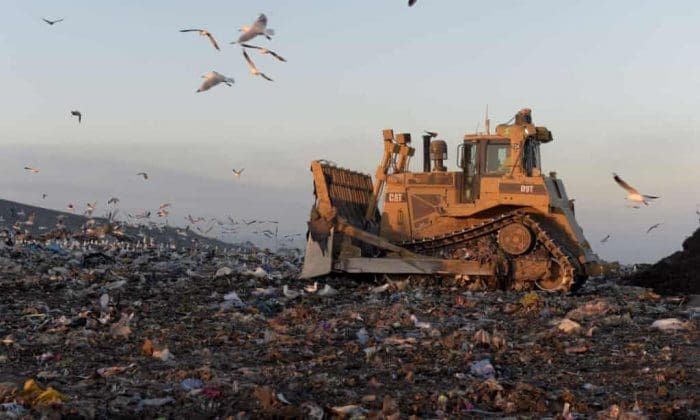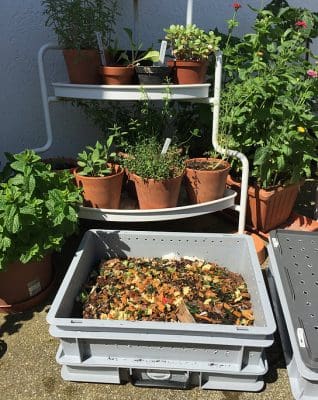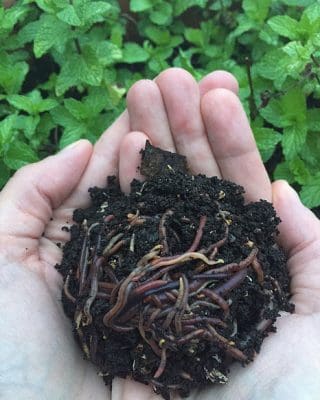On a drizzly Saturday, about 50 people came together at Basel’s waste incineration plant to learn about garbage.
Yup. We know how to party.
When it comes to talking trash, I get (arguably) unnaturally excited. And when I first moved here from the U.S., and learned about the Swiss garbage stickers, I immediately thought, “How brilliant!!! America needs this system.” Here is exactly why: the Swiss produced roughly 800,000 tons/year of garbage until 1993 when charging for bin bags was introduced. The result? A decrease by HALF! Half, people!
So, while at first we new-comers to Switzerland are a bit surprised and exasperated with the incredibly lengthy and specific rules surrounding waste, the fact of the matter is that when forced to confront just how much—oh, I’ll be nice—frickin’ crap we buy, and then rapidly dispose of, our behavior changes. For the better. We suddenly come face-to-face with just how much we consume…we see the overly packaged goods, the plastic-wrapped everything, in a new way because we pay for each and every thing we throw away.

So I love the lengthy rules. Bring ‘em on! I’ve talked to many expats who’ve all said the same thing—that they are now more conscious consumers.
But of course, there is more that can be done. We also learned on the tour that today, about 32% of total trash sent to the incinerator is organic waste, which could be diverted to composting, and 17% is paper or carton, which should be getting recycled. So, that’s another 50% reduction if everyone did his or her job properly.
Speaking of…what was interesting about this tour was that for someone who actively pursues “a life with less waste,” and who has a good knowledge of recycling and composting, I discovered I’d been doing some things wrong. What the..!?!
I’m so ashamed!
What can I say? I’d been relying on my previous California-based knowledge to make decisions when what to do and where to put some piece of waste was unclear, rather than take the time to translate the very handy, perfectly explanatory booklet the city sends to everyone. So, for all you expats who have also chucked that booklet into a drawer “to translate later,” read on…
PLASTIC: PET or not to PET?
PET: Food items bought in Switzerland grocery stores all seem to have a symbol on them to indicate whether you can recycle or not. PET is unquestionably easy. Those go in PET (at least I’d been getting that right!) and those bottles are clearly marked. You do NOT need to remove the screw-on lids from bottles. They get separated out during the process.
NON-PET: As for non-PET plastic recycling, stores in Switzerland selling things in plastic are obliged to take them back should you want to schlep them there. Basically any plastic food/drink container that is NOT PET can be put in these collection bins.
Bottles that the Migros and Coop collect:
- Dairy products
- Detergents and cleaners
- Shampoos, shower creams, soaps, lotions, creams
- Vinegar, oil, sauces
- plant food
What Migros does not collect on the recycling wall:
- Beverage cartons (eg Tetra Pak)
- Plastic bottles from the DIY and auto sector
- Bowls, cups, tubes, foils, refills
WEIRD EXCEPTION ALERT! Oil and vinegar bottles, even if marked PET, do not belong in the PET collection but in the plastic bottles collection. Confusing, I know. Glass is a better option, but the BEST option is to go waste-free by refilling your bottle again and again at Abfüllerei Basel, Basel Unverpackt, or Vom Fass.
GLASS:
Did you knock your wine glass over?! Before you head to the recycling bin with the pieces, check it out: You can’t put a drinking glass that breaks into recycling because there are some different “ingredients” that don’t melt at same temp as food containers. Broken glasses have to go into waste bin.
Not sure if that wine bottle if brown or green? Put it in green. And that blue gin bottle—where the heck does it go? Green.
PAPER:
When bundling your papers for recycling, it is helpful to separate cardboard from regular paper, but not mandatory.
You do not have to remove those plastic ‘screens’ over the address window of envelopes, and a few staples are ok, too.
If your holiday or birthday cards have some “sparkly, shiny bits” on them, they can still be recycled.
If cardboard has a small amount of food or oil on it, it can still be recycled.
Paper labels should be removed from yogurt containers for recycling.
When is paper not recyclable? If it is too dirty from food, like a saturated pizza box. (But it might be compostable…see below).
METAL:
Empty metal containers that held food (think whipping cream canisters, canned vegetables) can simply be recycled with your aluminum cans that are located with the glass recycling in all neighborhoods. Aluminum foil also goes there, even if it has food stuck on it.
Metal containers containing non-food-related items (deoderant, spray paint…) should be collected and recycled—but not where you put your beer cans! The Gemeinde has special metal collection dates and drop-off points, and all of these metals should be recycled there. Check your local area for location and hours.
COMPOSTING:
I’m lucky enough that my apartment building has collection bins for kitchen waste that the city picks up. Easy peasy! Jealous? Don’t be. Composting is easy, and the city wants to help you set it up. Check this out, people—after contacting them, they come to your home, bring the materials and advise you—free of charge. Whaaat?! Don’t know where to put it? No problem. You can compost almost anywhere, in private gardens and backyards, in multi-family houses, even on your balcony or in the basement.


There is literally NO reason why all of us shouldn’t be composting, people! Remember, roughly one third of the average Basel resident’s garbage is of organic, compostable material. Imagine the money you’ll save from diverting food scraps, not to mention that your trash won’t smell! So, grab your phone and dial this number: +41 61 377 89 81.
All the information is on the website of the Stadtgärtnerei!
And here you can find answers to many-a-composting questions.
Is it ok to put paper in the compost bin? Ugh, this answer was more complicated than I thought it would be…paper should first and foremost be recycled. If it’s too dirty with food, the compost bin is fine if there is nothing printed on it. This is because many inks contain metals. If it states ‘plant-based ink’ or ‘printed using soy ink’ then it is composter-friendly.
That would be my personal advice for your personal composter. For other paper/cotton items, there is much to consider. This is what I was told by the City:
“Cotton or paper articles tend to be compostable but are not recommended. These products are often treated and contaminated with make-up, pathogens, etc.. Hair from the brush can go, if the hair is not treated (e.g. not dyed or tinted or treated with hair spray or hair gel). Hair from hairdresser’s shops, for example, must not be disposed of via the organic flap. The lint from the tumble dryer should always be disposed of in the waste as this lint is left untreated. In addition, neighbourhood composting sites do not accept cotton or paper articles.”
So, that’s the ‘what’s what’ on recycling and composting in Basel as I’ve learned from the exceptionally informative tour. By the way, I highly recommend taking this tour, if only just to give yourself a kick in the pants to use less stuff.
Good luck, everyone! And thanks for reading.
Useful Resources:
IWB – Industrielle Werke Basel
Generation M – nachhaltig leben
Coop – Richtiges Recycling leicht gemacht
Carrie Aikman
